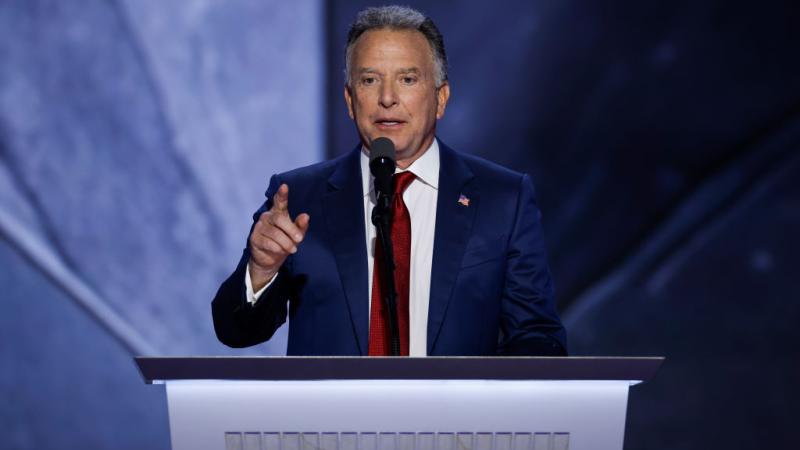Key House conservative offers option to keep government open, pause non-essential spending
Rep. Andy Biggs offers an out-of-the-box solution to the current budget stalemate. The question is whether it is enough to thread the needle established by hardcore budget hawks who may force a shutdown.
One of the most important conservatives inside the House GOP caucus is offering a novel solution that would allow House Speaker Kevin McCarthy to avoid a government shutdown later this month. The proposal would fund key priorities like the Ukraine war and natural disaster response in return for a temporary “pause on non-essential” programs like arts, superfluous research and non-critical foreign aid.
In an interview on the John Solomon Reports podcast set to air Tuesday, Rep. Andy Biggs, (R-Az.), suggested creating a continuing resolution (CR) that would fund key government operations past the end of the Sept. 30 fiscal year but would exclude non-critical agencies and programs, creating a few weeks for lawmakers to potentially reach a compromise to achieve some savings.
The concept would ensure all entitlement programs like Social Security, Medicare and Medicaid continue uninterrupted as well as key security, intelligence, border and counterterrorism programs while slicing out portions of agencies and programs like arts and humanities, research grants, noncritical foreign aid and even some federally funded assistance to illegal aliens inside the country.
“So now you're not shutting down the government. You actually are having a pause of non-essential spending is what it really boils down to,” Biggs explained in a wide-ranging interview with the John Solomon Reports podcast. “So nobody misses Medicare. Nobody misses Social Security. People continue to receive their benefits."
“There's a certain segment of non-essential actors in the federal government, who are basically there on standby and they ultimately get paid back. So that's why we say it's nothing more than a pause,” Biggs explained.
The pause, he said, would give Congress time to pass all 12 appropriations bills for fiscal 2024 as the GOP promised and perhaps identify in bipartisan, bicameral fashion a few hundred billions of dollars in cuts inside a planned $6 trillion federal budget.
At present, the House has only passed one appropriations bill and fears are that Congress is on a collision course with a shut down by early October over a budget stalemate.
Biggs, a former chairman of the conservative House Freedom Caucus whose members have often embraced government shutdowns to force spending cuts, said he prefers a fast and hard cut of spending to 2019 levels, which would, he says, essentially balance the budget. But he said that was improbable given the deal McCarthy cut in May with President Joe Biden and the wishes of Democrats who control the Senate and White House.
Biggs added that he believes there is a path for compromises that avoid the shutdown but deliver a down-payment on Republicans’ promise to shrink government by targeting superfluous, abusive or unnecessary spending.
“In some places we scalpel-ize stuff, in other places we take a chainsaw,” he said in describing his strategy. But he said that is better than either a shutdown or a deal in which moderate Republicans and Democrats team to keep spending at current record levels.
“That's why I'm saying if you could actually attack it through the CR, the continuing resolution itself, cut some of the stuff and actually take a step towards a more balanced budget,” he said.
He offered several examples of how things could be achieved to deliver wins for both fiscal conservatives and security hawks in a deal on the master continuing resolution. He said those wanting to add funding for the war in Ukraine already have enough votes cobbled together between Republican and Democrats to pass it but they could pick up fiscal conservative support by requiring Ukraine’s government to comply with any congressional oversight requests and creating a special inspector general to investigate and recover U.S. money that is being wasted or misused.
Other ideas that Biggs and other lawmakers floated for a compromise continuing resolution over the last several weeks include:
- Keeping all border funding but directly defunding Homeland Security Secretary Alejandro. Mayorkas’ salary as well as any grants to nonprofits and agencies helping to traffic illegal immigrants from the border to the interior of the country.
- Diverting some taxpayer savings to Texas to help authorize and fund that state’s effort to secure the border on its own.
- Banning funding for Homeland Security’s new "CPB One" app that allows illegal migrants to enter the country through ports of entry
- Ending grants for superfluous research projects across government;
- Funding most FBI operations but ban tax dollars for any warrantless spying targeting on Americans until FISA reform is completed. The bureau has admitted 280,000-plus improper phone records searches in recent years.
- Approving military operations but banning spending on any liberal ideology in the Pentagon, including critical race theory, diversity, equity and include and transgenderism programs.
Biggs said he was trying to be pragmatic to get something achieved between the conservatives and McCarthy that created progress on runaway spending. For instance, he said that requiring Ukraine as a condition of aid to give documents to Rep. James Comer’s probe of the Biden family, might lose votes. But requiring Ukraine to cooperate with all oversight probes, including the Biden family probe, might gain consensus.
Biggs said he was proposing the idea of a targeted government pause now to provide a path for compromise before the end of month deadline creates chaos and panic.
“I think people have to get acclimated,” he explained. “If they get acclimated to the idea, you know, sometimes Congress can act fast. But not too often. But when an idea catches fire, John, you and I both know, it could really take off.”
















